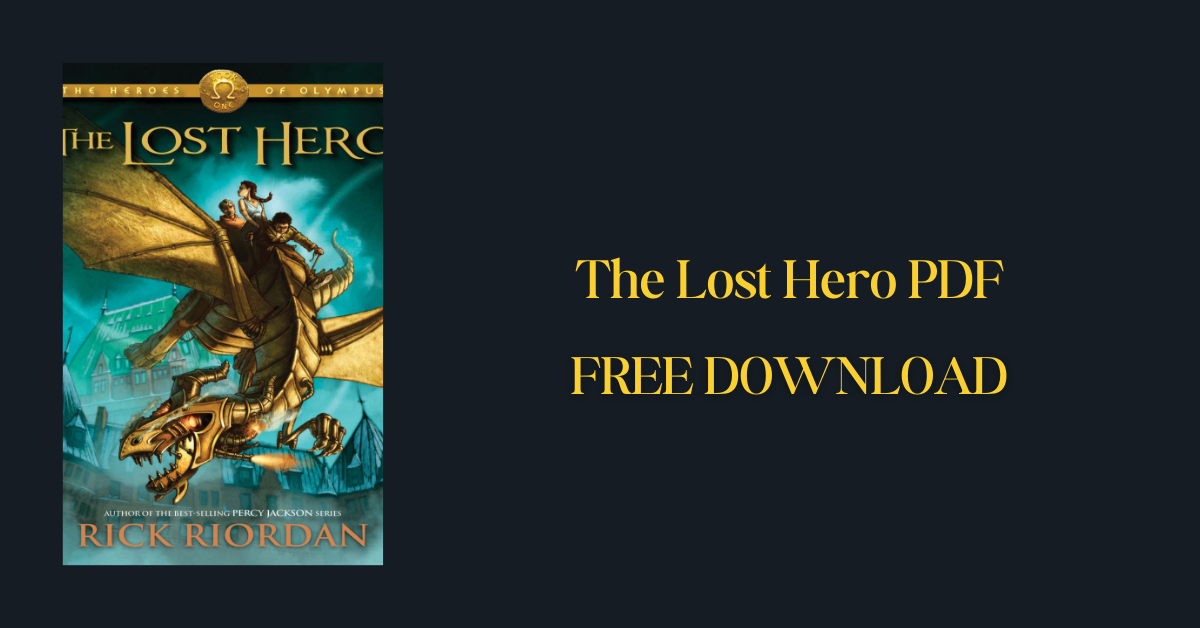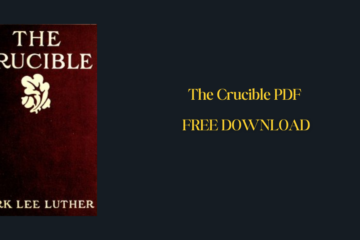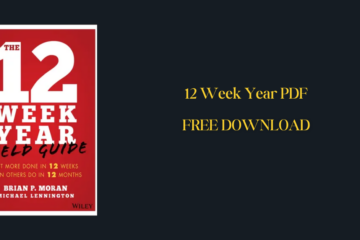“The Lost Hero” is a fantasy-adventure novel written by Rick Riordan, published in 2010. It is the first book in the “Heroes of Olympus” series, which is a sequel series to Riordan’s popular “Percy Jackson & the Olympians” series. The story follows three main characters: Jason Grace, Piper McLean, and Leo Valdez.
As the story unfolds, the characters’ pasts and destinies become intertwined, and they uncover secrets that could change the fate of the world. “The Lost Hero” sets the stage for the larger conflict that unfolds in the subsequent books of the series, as well as tying into the broader mythology established in Riordan’s other series.
| Name of the PDF | the lost hero pdf |
| No. of pages | 586 |
| Category | |
| Language | English |
| PDF Link | Click Here |
Also Download
The Angel Next Door Spoils Me Rotten PDF
Plot Summary of The Lost Hero
The story begins with Jason Grace waking up on a school bus with no memory of who he is or how he got there. He is accompanied by Piper McLean, his girlfriend, and Leo Valdez, his best friend. They are soon attacked by storm spirits and saved by Annabeth Chase, a demigod from Camp Half-Blood.
Annabeth takes them to Camp Half-Blood, where they learn that they are demigods—children of Greek gods—and that their memories have been wiped. Jason is claimed by Zeus, Piper by Aphrodite, and Leo by Hephaestus. Chiron, the camp’s activities director, sends them on a quest to rescue Hera, who has been captured by an unknown enemy.
The trio embarks on their quest with the help of Festus, a mechanical dragon built by Leo. Along the way, they encounter various challenges and monsters, including Medea, the sorceress, and the giant Enceladus. They also learn about the Roman camp for demigods, Camp Jupiter, and the looming threat of Gaea, the earth goddess.
As they journey across the country, Jason, Piper, and Leo discover more about their pasts and their abilities. They also encounter Hera’s son, Percy Jackson, who has gone missing, and enlist his help in their quest. Together, they manage to rescue Hera and defeat Enceladus, but not before learning that Gaea’s forces are growing stronger.
In the end, Jason, Piper, and Leo return to Camp Half-Blood, where they are greeted as heroes. However, they know that their journey is far from over and that they must prepare for the coming war against Gaea and her giants.
Characters of The Lost Hero
- Jason Grace: The protagonist of the story, Jason wakes up on a school bus with no memory of his past. He is claimed by the Greek god Zeus as his son and possesses the power of flight.
- Piper McLean: Jason’s girlfriend, Piper is claimed by the Greek goddess Aphrodite as her daughter. She has the ability to charm-speak, which allows her to persuade others with her voice.
- Leo Valdez: Jason’s best friend, Leo is claimed by the Greek god Hephaestus as his son. He is a skilled mechanic and builds Festus, a mechanical dragon.
- Annabeth Chase: A demigod from Camp Half-Blood, Annabeth is the daughter of the Greek goddess Athena. She helps Jason, Piper, and Leo and provides them with valuable information about the world of demigods.
- Coach Hedge: A satyr who serves as the trio’s protector on their quest. He is loud, brash, and fiercely loyal to his charges.
- Festus: Leo’s mechanical dragon, Festus is built by Leo and serves as their mode of transportation on their quest.
- Hera: The queen of the gods, Hera has been captured by an unknown enemy, and Jason, Piper, and Leo must rescue her as part of their quest.
- Percy Jackson: The hero of the previous series, Percy makes a brief appearance in “The Lost Hero” and helps Jason, Piper, and Leo on their quest.
Themes Explored in The Lost Hero
The Lost Hero explores several themes common to his works and the genre of young adult fantasy literature. Some of the prominent themes in the book include:
Identity: The theme of identity is central to the story, particularly as the main characters grapple with their lost memories and uncertain pasts. Jason, Piper, and Leo must come to terms with their identities as demigods, children of gods from Greek and Roman mythology, and reconcile their mortal and divine aspects.
Friendship and Loyalty: Friendship and loyalty are strong themes throughout the novel. Jason, Piper, and Leo demonstrate unwavering loyalty to one another as they embark on their quest, facing numerous challenges and dangers together. Their bond strengthens as they work as a team, relying on each other’s strengths to overcome obstacles.
Destiny and Fate: The concept of destiny and fate is explored as the characters navigate their roles in the larger conflict between the gods and the forces of darkness. Each character has a unique destiny and role to play in the unfolding events, and they must come to terms with their destinies while also exercising agency in shaping their own paths.
Courage and Sacrifice: Courage and sacrifice are themes that resonate throughout the novel as the characters confront danger and make difficult choices to fulfill their quest. They demonstrate bravery in the face of adversity and are willing to sacrifice their own safety for the greater good.
Good vs. Evil: The eternal struggle between good and evil is a fundamental theme in the story. The characters must confront various adversaries, including monsters and villains aligned with the forces of darkness, as they strive to thwart their plans and protect the world from destruction.
Family and Belonging: Family and belonging are themes that emerge as the characters grapple with their relationships with their mortal families and their newfound connections to the world of demigods. They find a sense of belonging and acceptance at Camp Half-Blood, where they discover others like themselves, and form bonds that transcend blood ties.
Symbolism in The Lost Hero
The Lost Hero incorporates various symbols and symbolic elements throughout the story, adding depth and richness to the narrative. Some of the notable symbols include:
The Greek and Roman Gods: The gods themselves serve as symbols of various aspects of human nature, such as power, love, wisdom, and jealousy. Their actions and conflicts reflect universal themes and human experiences.
Camp Half-Blood and Camp Jupiter: These two demigod camps represent different aspects of the demigod world. Camp Half-Blood symbolizes Greek mythology and culture, while Camp Jupiter symbolizes Roman mythology and culture. Their differences and similarities highlight the complexities of identity and heritage.
The Lost Memory: The main characters’ lost memories symbolize the journey of self-discovery and identity. As they regain their memories and uncover their pasts, they also come to understand themselves better and embrace their destinies.
The Quest: The quest to rescue Hera symbolizes the hero’s journey and the eternal struggle between good and evil. It represents the characters’ growth, challenges, and ultimate triumph over adversity.
The Mechanical Dragon, Festus: Festus symbolizes ingenuity, creativity, and the power of human invention. As Leo’s creation, Festus reflects Leo’s resourcefulness and determination to overcome obstacles.
The Storm Spirits: The storm spirits that attack the characters symbolize the obstacles and challenges they face on their journey. They represent external forces that seek to thwart their quest and test their resilience.
The Labyrinth: The Labyrinth, a recurring element in Riordan’s works, symbolizes the complexities of life and the journey of self-discovery. It represents the twists and turns of fate and the need for courage and perseverance to navigate through challenges.
Critical Reception of The Lost Hero
The Lost Hero garnered positive reception upon its release, enjoying acclaim from readers, critics, and reviewers alike. Praised for its fast-paced plot, engaging characters, and inventive integration of Greek and Roman mythology, the novel was celebrated for its ability to create a captivating world filled with humor, action, and adventure.
Riordan’s established reputation as a writer of middle-grade and young adult fantasy novels, particularly through his previous series, “Percy Jackson & the Olympians,” contributed to the commercial success of “The Lost Hero,” which reached bestseller lists and cultivated a dedicated fanbase.
Appealing to both existing fans and newcomers, the book served as both a continuation of the established universe and an entry point for readers new to Riordan’s works, introducing them to the world of demigods and mythology.
While some critics noted similarities to Riordan’s previous works, particularly in terms of plot structure and themes, many appreciated the depth of character development, particularly in the main characters—Jason, Piper, and Leo.
Despite some criticism regarding potential overwhelming complexity for readers unfamiliar with Roman mythology, “The Lost Hero” laid a solid foundation for the “Heroes of Olympus” series and left readers eagerly anticipating further adventures with its characters.
Conclusion
The Lost Hero by Rick Riordan stands as a testament to the author’s skill in crafting immersive and engaging fantasy adventures. With its blend of Greek and Roman mythology, fast-paced plot, and memorable characters, the novel captivated readers and critics alike, earning praise for its inventive storytelling and thematic depth.
While some noted similarities to Riordan’s previous works, the book’s commercial success and enduring popularity underscore its appeal to audiences both familiar with his universe and new to his storytelling.
As the first installment in the “Heroes of Olympus” series, “The Lost Hero” sets a high standard for the books that follow, leaving readers eager to continue the journey with Jason, Piper, Leo, and the rest of the demigods as they confront destiny, friendship, and the eternal struggle between good and evil in the pages that lie ahead.
FAQs
What is “The Lost Hero” about?
“The Lost Hero” follows the story of three demigods—Jason Grace, Piper McLean, and Leo Valdez—as they embark on a quest to rescue the goddess Hera, who has been captured by an unknown enemy. Along the way, they uncover secrets about their pasts and destinies that will shape the fate of the world.
Is “The Lost Hero” part of a series?
Yes, “The Lost Hero” is the first book in the “Heroes of Olympus” series by Rick Riordan. It serves as a sequel series to the “Percy Jackson & the Olympians” series and continues to explore the world of Greek and Roman mythology.
Do I need to read the “Percy Jackson” series before reading “The Lost Hero”?
While it’s not necessary to read the “Percy Jackson” series before diving into “The Lost Hero,” doing so may provide additional context and background information about the world and characters. However, “The Lost Hero” is designed to be accessible to readers new to Riordan’s works.
What age group is “The Lost Hero” suitable for?
“The Lost Hero” is primarily targeted towards middle-grade and young adult readers, typically ranging from ages 10 to 14. However, it has also been enjoyed by readers of various ages due to its engaging storytelling and universal themes.
Are there any themes or content in “The Lost Hero” that parents should be aware of?
The book contains themes such as friendship, identity, and the struggle between good and evil. While it deals with fantastical elements and mythology, there’s no explicit content, making it suitable for most young readers.
Are there more books in the “Heroes of Olympus” series after “The Lost Hero”?
Yes, “The Lost Hero” is followed by four more books in the “Heroes of Olympus” series: “The Son of Neptune,” “The Mark of Athena,” “The House of Hades,” and “The Blood of Olympus.” These books continue the story arc introduced in “The Lost Hero” and further develop the characters and conflicts.

Niketa Mulay, a seasoned content writer and editor, has over a decade of experience. With a Master’s in Journalism, she honed her skills at The Times of India and now freelances across various industries. Passionate about reading, writing, and scuba diving, she shares expert PDF guides and tips at PDFdrivehub.com.




